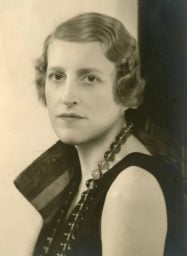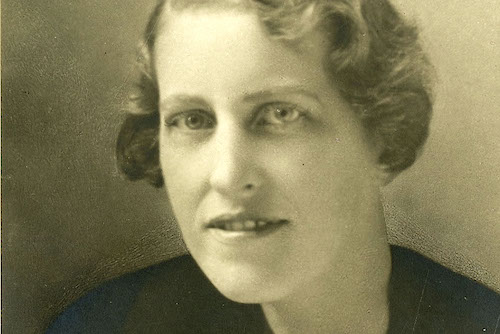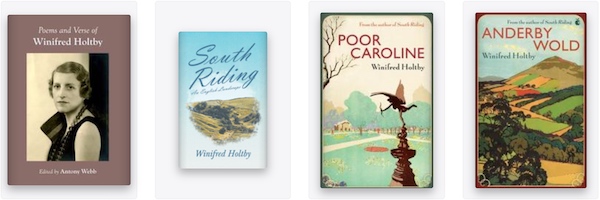Winifred Holtby, Author of South Riding
By Marcie McCauley | On December 16, 2020 | Updated August 5, 2023 | Comments (0)

Winifred Holtby (June 23, 1898 – September 29, 1935) was an accomplished British author, journalist, and activist. Best known for her posthumously published novel, South Riding (1936), she had published six novels in her lifetime, and fourteen books in total.
She also had a successful career in journalism and wrote the first critical study of Virginia Woolf in English. During her lifetime, her fame derived from her work for prominent newspapers and magazines, including the feminist publication Time and Tide.
Winifred wrote about democracy and social welfare, feminism and pacifism, education and responsibility, racism and injustice. After her death, her fame grew with the publication of Testament of Friendship (1940), written by her lifelong friend, Vera Brittain.
Childhood and Family History
Winifred’s mother, Alice Winn, was born in 1858; by 1880, she was working as a governess in East Riding for a wealthy farming family, at Rotsea on the coast. There, she met David Holtby. She married him in 1892 and they lived in Rudstone House, which the Holtby family would occupy until 1919.
Their daughter Grace was born in 1896; two years later, Winifred was born. The girls were raised in comfort and enjoyed considerable freedom, relative to other girls of that era.
Alice nurtured Winifred’s creativity, even arranging for a book of poems to be published in 1911: My Garden and Other Poems. Alice remained close with her daughter until Winifred died but, over time, the gaps between their political views widened and Alice disapproved of Winifred’s literary work.
When they were young, Grace and Winifred wrote and performed their own melodramas; the sisters were educated by governesses and Winifred was an avid reader.
She enjoyed poetry like “The Ballad of Chevy Chase” (popular ballads also referred to in Emily Brontë’s Wuthering Heights (1847) and Elizabeth Gaskell’s North and South) as well as novels, like Baroness Orczy’s The Scarlet Pimpernel (1905).
. . . . . . . . .

. . . . . . . . . .
Education
In 1909, Winifred went to Queen Margaret’s School, a boarding school in Scarborough, where she was nearly two years younger than the youngest students.
Her health suffered while she studied there; but in 1914, when the school was evacuated (war had been declared the previous August) to Pitlochry in Scotland, her health improved, and she became an active contributor to the school magazine. In early 1916, she passed the entrance exam for Somerville College, Oxford.
Winifred’s access to education and members of the establishment via family connections, along with her coming-of-age in comfort and security, influenced her ideas about feminism. She would rely on later experiences in the wider world to illustrate the injustices that many other women (and men with less privilege than the men in her family) faced in their daily lives.
Working Life
Winifred interrupted her course of studies to work as a nurse for a year, performing mundane tasks and earning just enough to cover uniforms and bus fare. In July 1918, she enrolled in the Women’s Army Auxiliary Corps (WAAC), and served for about a year. She was posted as a hostel forewoman near Abbeville in France and, while there, wrote twelve chapters of a book which she tentatively titled The Forest Unit.
When she finally returned to Oxford for the Michaelmas term in 1919, she soon met Vera Brittain, who had also elected to study history. Their meeting is described in three of Vera Brittain’s books: her 1923 debut novel The Dark Tide, her 1933 memoir Testament of Youth, and the memoir published after Winifred Holtby’s death, Testament of Friendship (1940). Both women graduated with second-class degrees in 1921.
. . . . . . . . .

. . . . . . . . .
Writing Life
While sharing a flat with Vera Brittain, Winifred started her debut novel in 1921, Anderby Wold, about a Yorkshire farming family. It was published in 1923 by John Lane, who also published her second novel, The Crowded Street, in 1924. The Crowded Street is considered her first “spinster” novel, with 1931’s Poor Caroline her second: in both novels, women choose futures for themselves which preclude marriage.
After Vera married in 1925, Winifred’s independence surged. She had been published by the feminist journal Time and Tide in 1923 and accepted a directorship there in 1926. She was confronted by the divisions within the feminist community, which she referred to as Old Feminism and New Feminism. Broadly speaking, “old” meaning an egalitarian perspective, and “new” meaning that women were viewed as unique and separate.
Winifred gave lectures for the League of Nations and joined the Union of Democratic Control, which planned for democratic management of peace in postwar Europe (and would become a member of its executive committee two years later).
She traveled to South Africa, where she wrote again about a Yorkshire family in Land of Green Ginger (1927), but also became morally outraged by the overt racism in South African society.
This overseas experience led her to establish the Society of Friends of Africa; it also informed her fifth novel, Mandoa! Mandoa! (1933), a comic novel designed to expose the inequities and atrocities she observed. In the later 1920s, she gained substantial recognition for her journalism, writing for The Manchester Guardian, The Nation, and The New Leader, among others. In 1929, she published A New Voter’s Guide to Party Programs.
Changing Times
Winifred gradually moved towards Olive Schreiner’s Women and Labour organization (and away from the League of Nations). She was also friendly with Storm Jameson and, in 1929, she stayed with Rebecca West in her villa on the Riviera.
She met with Virginia Woolf once while working on her critical study of Woolf’s work and a few times after Virginia Woolf: A Critical Memoir (1932) had been published (apparently at Woolf’s request).
Back at home, tending to her father in his final stages of illness in 1932, Winifred received a fatal diagnosis herself. She didn’t disclose her condition—renal sclerosis—to anyone, but only intensified her work.
She published The Astonishing Island, a satire on “True Womanhood” in 1933, a volume of non-fiction Women and a Changing Civilisation in 1934, and two collections in 1935—poems in The Frozen Earth and stories in Truth is Not Sober and Other Stories.
. . . . . . . . . .

. . . . . . . . . .
An early death, and posthumous publications
After suffering from poor health for two years or more, Winifred Holtby died in 1935 of Bright’s Disease, a form of kidney failure. She was just 34 years old.
Posthumous publications included the famous South Riding (1935), which Vera Brittain ushered through the publication process after Winifred’s death.
South Riding’s publication was completed with Vera Brittain’s intervention, overriding Alice Holtby’s concerns. It has never been out of print and sold 40,000 copies in the first year in the UK and 20,000 copies in the US. It was awarded the James Tait Black Memorial Prize in 1937 and, over time, has enjoyed a resurgence of popularity with a film, radio dramatizations, and the 2011 BBC television series.
Next came a collection of correspondence, Letters to a Friend (1937), and a play, Take Back Your Freedom (1939). A second collection of short stories would be compiled and published as Remember Remember much later (1999), as well as The Death and Legacy of Winifred Holtby.
In Testament of Friendship (1940), Vera Brittain writes about Winifred’s confinement in a nursing home for the final nineteen days of her life. She also elaborates on the relationship between Winifred and Harry Lindam Pearson. As a boy, Harry had participated in the Holtby sisters’ theatricals on the farm and their families expected they would marry.
In 1924, both Winifred and Vera worked to secure Harry employment in London. Despite their on-again-off-again relationship, Harry was at Winifred’s bedside in her final days and Vera describes his marriage proposal in her memoir, suggesting that it brought Winifred happiness at the end:
“She died in her sleep just as dawn was breaking over London. It was the last Sunday in September and a gentle, radiant morning.”
. . . . . . . . . .
 . . . . . . . . . . .
. . . . . . . . . . .
Winifred Holtby’s legacy
In December 1940, The Friends of Africa and the Johannesburg City Council established the Winifred Holtby Memorial Library in Western Native Township; it was equipped with her personal collection and dedicated for use by non-Europeans, women as well as men.
The Royal Society of Literature established the Winifred Holtby Memorial Prize in 1967 for the best regional novel. Winifred Holtby wrote about Rudston and the wolds of East Riding in Anderby Wold; Cottingham, a suburb of Hull, in The Crowded Street; the Dales country, where her mother was born, in The Land of Green Ginger; and she captured the largesse of the Rudston household in South Riding with the character of Mrs Beddows. She captured the geographic and emotional landscape of these regions and their inhabitants.
Further Reading
The title of Marion Shaw’s biography The Clear Stream: A Life of Winifred Holtby (1999) comes from a statement Winifred made to Vera after three publishers had queried Winifred about an autobiography:
“I don’t see how I can write an autobiography. I never feel I’ve really had a life of my own. My existence seems to me like a clear stream which has simply reflected other people’s stories and problems.”
Suitably, then, Shaw’s biography is not arranged chronologically, but by chapters dedicated to the other people who played key roles in Winifred’s life. It makes for compelling and story-driven reading; readers and writers alike will find Shaw’s biography rewarding and informative.
Contributed by Marcie McCauley, a graduate of the University of Western Ontario and the Humber College Creative Writing Program. She writes and reads (mostly women writers!) in Toronto, Canada. And she chats about it on Buried In Print and @buriedinprint.
More about Winifred Holtby
Novels
- Anderby Wold (1923)
- The Crowded Street (1924)
- The Land of Green Ginger (1927)
- Poor Caroline (1931)
- Mandoa! Mandoa! (1933)
- The Astonishing Island (1933)
- South Riding (1936; posthumous)
Short stories and a play
- Truth is Not Sober and Other Stories (1934; short stories)
- Take Back Your Freedom (1939; a play, posthumous)
- Remember Remember (1999; short stories, posthumous)
Poetry
- My Garden (1911)
- The Frozen Earth (1935)
Nonfiction
- A New Voter’s Guide to Party Programmes (1929)
- Virginia Woolf: A Critical Memoir (1932)
- Women and a Changing Civilisation (1934)
- Letters to a Friend (1937; posthumous)
More information
- Wikipedia
- The Adaptable Winifred Holtby
- Winifred Holtby: Author, Feminist, Campaigner
- Reader discussion of Holtby’s works on Goodreads
Leave a Reply